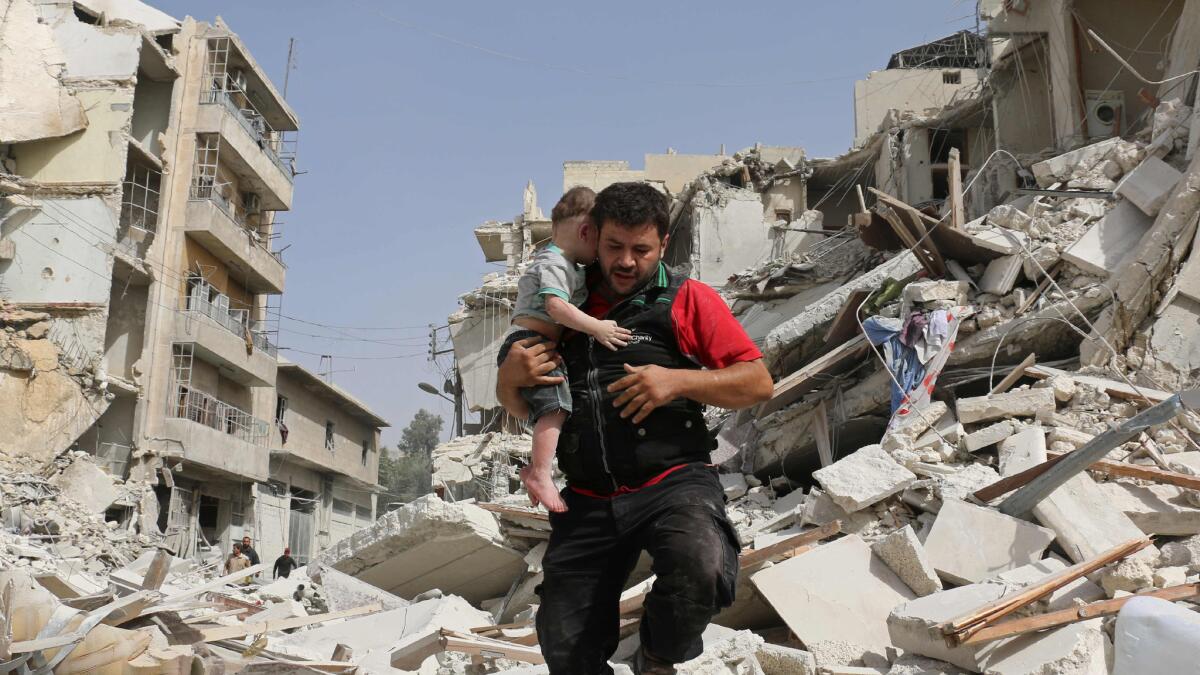Efforts to shore up the Syrian cease-fire have faltered on all fronts

- Share via
As flames leaped high in the battered northern Syrian city of Aleppo, hopes faded anew on Thursday for any revival of Syria’s broken cease-fire.
In a week meant to showcase the diplomatic drive to shore up the truce, rush humanitarian aid to the country’s hardest-hit areas, isolate and target jihadist fighters and lay the groundwork for moves toward a political solution to the grinding five-year conflict, efforts faltered on all fronts.
“It’s clear we cannot continue on the same path,” U.S. Secretary of State John F. Kerry told reporters Thursday after a round of high-level talks on the sidelines of the U.N. General Assembly meeting.
Kerry repeated the call made a day earlier for Russia and Syria to ground their aircraft operating over key aid-delivery routes.
That appeal went unheeded. The heaviest airstrikes in months pounded opposition-held districts of Aleppo on Thursday, killing dozens of people, witnesses and activists reported. Activists circulated video of massive fires, apparently ignited by incendiary weapons.
Syria’s military command said it was launching a major offensive to seize the city’s rebel-held eastern sector, the state-run news agency reported — an announcement that coincided with the talks in New York by the Syrian Support Group, made up of senior envoys from countries with an interest in the conflict.
Amid the new wave of violence, President Bashar Assad struck a defiant tone. In a rare interview published Thursday, he blamed the United States for the breakdown of the Sept. 12 truce and accused Washington of lacking the will to confront the militants of Islamic State — claims the State Department branded “ridiculous.”
Assad, who spoke to the Associated Press, also rejected American accusations that a U.N. convoy destroyed Monday en route to Aleppo was hit by Syrian or Russian planes. And he denied that Syrian forces were preventing aid deliveries to opposition-held parts of Aleppo, or using barrel bombs against civilians — both well-documented practices.
Syria’s multi-sided war has been marked by the indiscriminate targeting of civilian areas, but Assad was dismissive when questioned about his methods.
“When you have terrorists, you don’t throw at them balloons, or you don’t use rubber sticks for example,” he told the Associated Press. “You have to use armaments.”
In one bright spot amid a grim landscape, U.N. trucks bearing badly needed supplies made their way to the rebel-held Damascus suburb of Muadhamiya, the United Nations said. That followed a 48-hour hiatus after the aid convoy outside Aleppo was attacked Monday night, killing about 20 civilians.
But the world body said security fears were preventing vital deliveries to other besieged areas, which are home to an estimated 1 million Syrians. Jan Egeland, the U.N. special advisor on humanitarian affairs, said at a briefing in Geneva that 40 aid trucks were poised at the Turkish-Syrian frontier, unable to proceed to areas such as Aleppo’s rebel-held east.
Describing Monday’s convoy strike as the worst incident of its kind in the course of the conflict, Egeland called for an independent inquiry into the attack, asking how humanitarian workers could be expected to continue their “sacred service to the Syrian people” under threat of more attacks.
“Let this be the turning point,” he told reporters. “Let this be the bleakest moment.”
Prior to the talks in New York, Syrian opposition groups released a letter saying they would not support a resumption of the truce unless consequences for violating it were spelled out. Without such enforcement mechanisms, they said, violence would rage unchecked.
Even before Thursday’s talks, Russia had declared that Kerry’s no-fly proposal — issued amid a highly acrimonious U.S.-Russian exchange at U.N. Security Council a day earlier — was infeasible. The state-run Tass news agency quoted Russia’s deputy foreign minister, Sergei Ryabkov, as saying the U.S. plan “won’t work.”
More talks were set Friday.
MORE WORLD NEWS:
Kerry lashes out at Russia, calls for grounding of all aircraft over humanitarian routes in Syria
U.N. suspends aid deliveries to Syria after deadly attack on humanitarian convoy
UPDATES:
4:30 p.m.: This article was updated with additional details, including comments from U.S. Secretary of State John F. Kerry.
3:09 p.m.: This article was updated with the government’s announcement of a major offensive in Aleppo.
This article was first published at 1:30 p.m.
More to Read
Sign up for Essential California
The most important California stories and recommendations in your inbox every morning.
You may occasionally receive promotional content from the Los Angeles Times.













